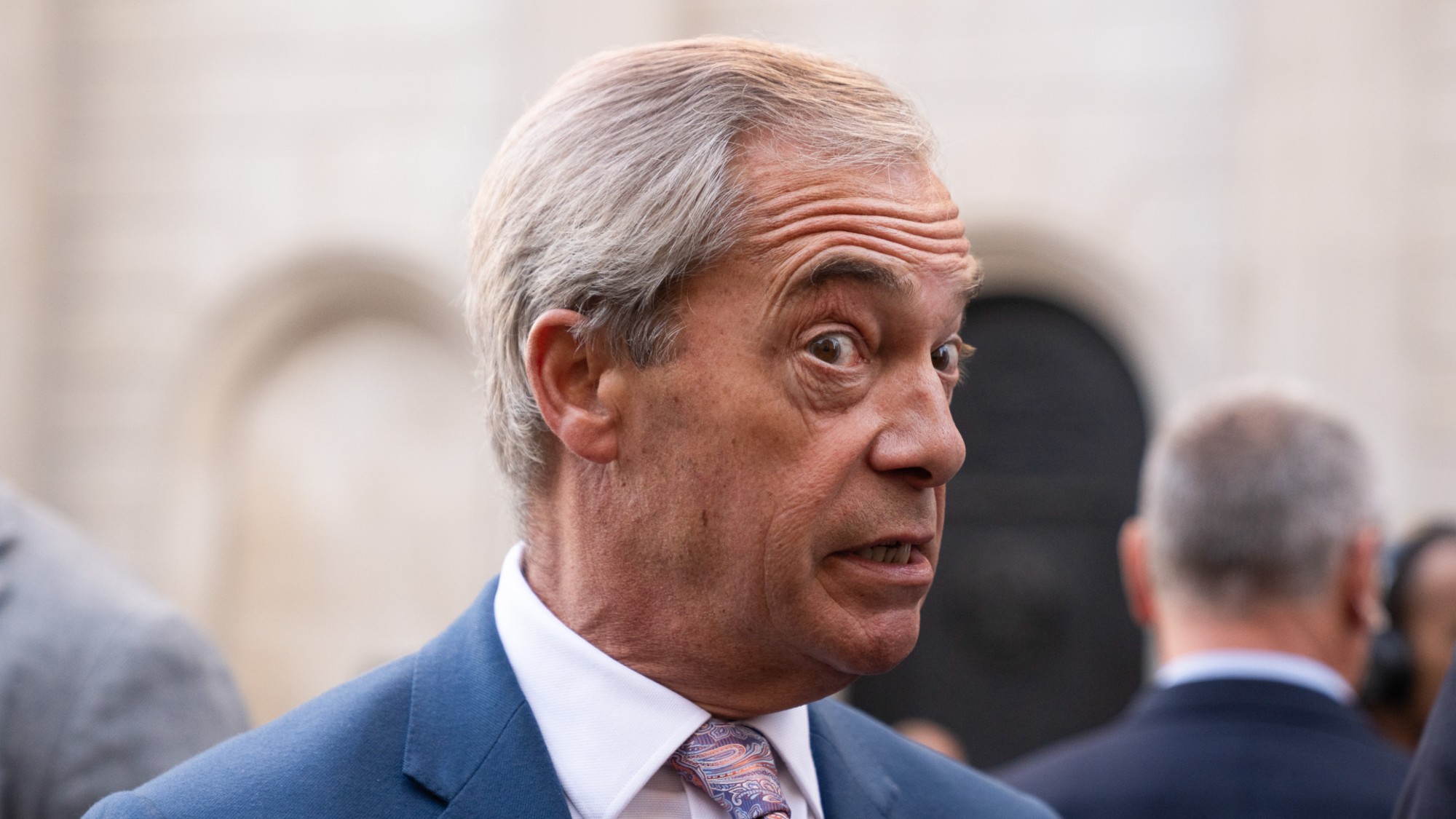Does Reform have a Russia problem?
Nigel Farage is ‘in bed with Putin’, claims Rachel Reeves, after party’s former leader in Wales pleaded guilty to taking bribes from the Kremlin

A free daily email with the biggest news stories of the day – and the best features from TheWeek.com
You are now subscribed
Your newsletter sign-up was successful
The public “should be in a state of collective outrage and revulsion” at the crimes of Nathan Gill, said Neil Mackay in The Herald.
Gill, Reform UK’s former leader in Wales, has admitted accepting bribes in exchange for making statements in favour of Russia while he was a member of the European Parliament.
‘In bed with Putin’
The 52-year-old pleaded guilty to eight counts of bribery between December 2018 and July 2019 involving payments from Oleg Voloshyn, whom the US government once described as a “pawn” of Russia’s secret services.
The Week
Escape your echo chamber. Get the facts behind the news, plus analysis from multiple perspectives.

Sign up for The Week's Free Newsletters
From our morning news briefing to a weekly Good News Newsletter, get the best of The Week delivered directly to your inbox.
From our morning news briefing to a weekly Good News Newsletter, get the best of The Week delivered directly to your inbox.
But instead of outrage, there’s “a collective sense of ‘oh well, so now we know the rumours were true’”, said Mackay. That “tells you all you need to know about Reform”. Gill may no longer be a member of Nigel Farage’s party, but when it comes to connections between Russia and the British far-right, “there’s much to pick over”.
Farage is “in bed with Putin”, Rachel Reeves claimed at the recent Labour conference. Boris Johnson, a one-time Farage ally, also described his stance on Russia as “extremely dangerous”. The former prime minister recently told the “Harry Cole Saves the West” show that he had “serious anxieties” about Reform’s position on the Ukraine war.
The Reform leader does have a “long record of falling for even the most inventive of Kremlin cock-and-bull tales”, said The Telegraph. His response to Putin’s first invasion of Ukraine in 2014 “proved his willingness to believe Russian propaganda”. Putin’s “cover story” was that Ukraine had “provoked its own invasion” by applying to join the EU and Nato. That year Farage told the European Parliament that “amongst the long list of foreign policy failures” had been “the unnecessary provocation” of Putin – although Putin had already annexed Crimea.
Far from retreating from this speech, he “retweeted it approvingly” last year. Even on the day of Russia’s full-scale invasion of Ukraine in 2022, “he could not stop himself from repeating the Kremlin’s cover story that the whole tragedy was a ‘consequence of EU and Nato expansion’”.
A free daily email with the biggest news stories of the day – and the best features from TheWeek.com
Until the channel was banned, Farage had a regular paid role on Kremlin broadcaster Russia Today, voicing similar views. Such thoughts raise “a vital question: is there anything he would not believe if the Kremlin claimed it to be true?”
‘Ideological alignment’
During the last general election, ABC News in Australia discovered a “network of Facebook pages” spreading “pro-Kremlin talking points” and posting support for Reform. Some of the posts were shared by Reform candidates.
In March, The New York Times reported that “one of the biggest corporate donors” to Reform had “sold almost $2 million” worth of sensitive technology to “a major supplier of Moscow’s blacklisted state weapons agency” – just two days after Farage was announced as party leader.
There is “no suggestion” that Farage ever received illegal bribes for his opinions about Russia, said Byline Times. But the Gill case highlights “a consistent alignment between senior members of Reform and Kremlin messaging”. And as Reform continues to rise in UK polls, that “ideological alignment raises urgent questions in need of answers”.
A person or a party “does not need to be a paid stooge of the Kremlin to be a threat to national security”, said Mackay. “Simply being in any way simpatico with Putin should be enough in this day and age to render a movement or an individual so beyond the moral pale as to be unelectable.”
Harriet Marsden is a senior staff writer and podcast panellist for The Week, covering world news and writing the weekly Global Digest newsletter. Before joining the site in 2023, she was a freelance journalist for seven years, working for The Guardian, The Times and The Independent among others, and regularly appearing on radio shows. In 2021, she was awarded the “journalist-at-large” fellowship by the Local Trust charity, and spent a year travelling independently to some of England’s most deprived areas to write about community activism. She has a master’s in international journalism from City University, and has also worked in Bolivia, Colombia and Spain.
-
 What is the endgame in the DHS shutdown?
What is the endgame in the DHS shutdown?Today’s Big Question Democrats want to rein in ICE’s immigration crackdown
-
 ‘Poor time management isn’t just an inconvenience’
‘Poor time management isn’t just an inconvenience’Instant Opinion Opinion, comment and editorials of the day
-
 Bad Bunny’s Super Bowl: A win for unity
Bad Bunny’s Super Bowl: A win for unityFeature The global superstar's halftime show was a celebration for everyone to enjoy
-
 ‘The forces he united still shape the Democratic Party’
‘The forces he united still shape the Democratic Party’Instant Opinion Opinion, comment and editorials of the day
-
 Trump’s ‘Board of Peace’ comes into confounding focus
Trump’s ‘Board of Peace’ comes into confounding focusIn the Spotlight What began as a plan to redevelop the Gaza Strip is quickly emerging as a new lever of global power for a president intent on upending the standing world order
-
 Three consequences from the Jenrick defection
Three consequences from the Jenrick defectionThe Explainer Both Kemi Badenoch and Nigel Farage may claim victory, but Jenrick’s move has ‘all-but ended the chances of any deal to unite the British right’
-
 The high street: Britain’s next political battleground?
The high street: Britain’s next political battleground?In the Spotlight Mass closure of shops and influx of organised crime are fuelling voter anger, and offer an opening for Reform UK
-
 Trump considers giving Ukraine a security guarantee
Trump considers giving Ukraine a security guaranteeTalking Points Zelenskyy says it is a requirement for peace. Will Putin go along?
-
 What have Trump’s Mar-a-Lago summits achieved?
What have Trump’s Mar-a-Lago summits achieved?Today’s big question Zelenskyy and Netanyahu meet the president in his Palm Beach ‘Winter White House’
-
 Why, really, is Trump going after Venezuela?
Why, really, is Trump going after Venezuela?Talking Points It might be oil, rare minerals or Putin
-
 Who is paying for Europe’s €90bn Ukraine loan?
Who is paying for Europe’s €90bn Ukraine loan?Today’s Big Question Kyiv secures crucial funding but the EU ‘blinked’ at the chance to strike a bold blow against Russia